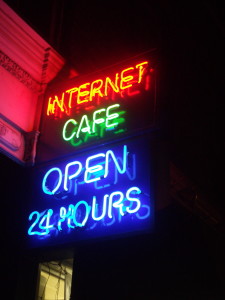Internet Cafes: What are they selling?
July 22, 2013
If one were to Google “Internet Cafe”, a consortium of choices will confront you. What are these Internet Cafes and what are they really selling? Some would describe them as storefronts conducting gambling operations (unlicensed, unregulated, untaxed, and illegal.) Proprietors of these cafes describe their operation as providing a service or product; phone cards and Internet time, as well as a chance to win prizes. In fact, they compare their operation to that of a sweepstakes such as the McDonald’s Monopoly game or one of the big companies (like Home Depot, Olive Garden, K-mart) that offer customers an opportunity to win a prize if they complete an online survey (after purchasing a product).
In an article by the Daily Breeze discussing the recent decision by the State of California to ban these Internet cafes, they describe how these cafes ‘work’:
Inside these cafes, customers first purchase cards for Internet or long-distance phone calls. But instead of using the cards for that purpose, they buy credits that translate to “entries” into sweepstakes games on personal computers inside the stores. The games closely mimic those of slot machines, with cartoon images of fruit, animals and other characters on simulated spinning wheels. Players rack up “sweepstakes credits” that they can exchange for cash.
It’s easy to see how they could be construed to be conducting both a sweepstakes and enticing their customers to gamble longer and without requirements to have guidelines in place to ensure that patrons are of legal age, that they are playing responsibly, and that customers are fully aware of what they are actually purchasing. Click here to see the full text of that article.
There is no question that these Internet cafes generate BIG money in revenues, to the tune of over a billion dollars a year. However, these cafes are not paying the same percentage of tax that regulated gambling are taxed; therefore, depriving states of additional revenue. It’s for this reason that some states feel that they are better served to regulate (and collect licensing fees as well as revenues) from these cafes rather than spending tax dollars and law enforcement manpower to shut down these operations. In an article discussing the proliferation of these internet sweepstake cafes in Ohio, one solution has been suggested to regulate these cafes. Furthermore, proponents state that it would be better for the consumer to regulate these operations for the following reasons: It would ensure that operators are vetted through background checks, devices are properly certified to have not been tampered with, eliminates possibility of false advertising claims, and can require owners of these cafes to advertise hotlines for patrons that may have a gambling problem.
What started as an exercise in curiosity about these cafes has instead invoked many more questions. It does seem clear that the federal government currently chooses to not outright ban these internet cafes, but instead has chosen to allow individual states to determine what they want to do with these cafes. Even so, it was interesting to read through the 34 page ‘white paper’ put out by UNLV’s Gaming Law Journal on Internet Cafes. Well-written and researched, it provided an expansive view of the history and evolution of these cafes, how various court cases over the years continue to impact states’ decisions today with regard to these cafes, as well as the author’s conclusions.
Finally, one other note of interest regarding these internet cafes. It would seem that states that have various levels of regulated gambling such as those found in Nevada, Mississippi, and New Jersey with Gaming Commissions have not experienced the proliferation of these cafes that other states with little or no gaming authorities in place have encountered. Could it be that those states with the Gaming Commissions have clearly defined a slot machine, a gambling device, sweepstakes versus gambling, lotteries versus raffles, thus eliminating the need to determine if a prize, chance, and consideration are present to meet the federal law’s requirements of whether gambling has taken place?


